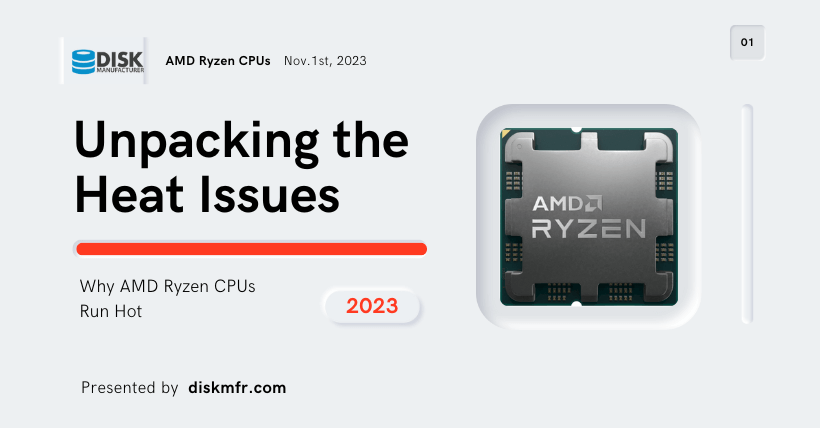In 2019, AMD introduced the Ryzen 3000 series, marking a significant leap in CPU performance. However, this boost in power came at a cost – increased operating temperatures. Fast forward to the present day, and AMD’s latest Ryzen 7000 series has pushed the boundaries further, allowing CPUs to run at temperatures as high as 95°C. Even AMD’s Vice President, David McAfee, has acknowledged that this heat issue isn’t going away anytime soon.
01
The Heat Conundrum
So, what’s causing AMD’s Ryzen CPUs to run so hot? There are two primary reasons behind this phenomenon.
1. Increasing Density vs. Efficiency
One major factor contributing to the rise in CPU temperatures is the trend in advanced semiconductor fabs, such as TSMC, to increase density at the expense of efficiency. This drive for higher density leads CPU designers, like those at AMD, to generate more heat as they chase greater processing efficiency. As a result, simply reducing performance to lower power consumption and heat is not a viable option.
2. Small Chiplet Design
Another key reason behind the heat issue is AMD’s use of small chiplet design structures in their high-performance CPUs. These structures isolate the CPU cores from the rest of the chip, preventing the heat generated from spreading throughout the processor before reaching the cooler. In contrast, non-small chiplet designs allow the heat produced by CPU cores to disperse to other parts of the chip, increasing the surface area for heat transfer to the cooler. As technology advances, chips become hotter, intensifying the heat concentration in small chiplet design structures.
02
The Challenge of Small Chiplet Design
It’s essential to recognize that high heat concentration is an inherent drawback of small chiplet design structures, and mitigating it requires improvements in fabrication processes. AMD has disclosed its collaboration with TSMC on process technology, but a concrete solution to the heat concentration issue remains elusive. If reducing heat proves unattainable, raising the safe temperature limit beyond 95°C might become a viable option.
03
Exception for Low-Power Ryzen Chips
David McAfee’s statement underlines that low-power non-X Ryzen chips do not encounter the same heating problem and still deliver excellent performance. For chips like the Ryzen 5 7600, Ryzen 7 7700, and Ryzen 9 7900, reducing clock speed and voltage is a highly effective strategy. However, for flagship processors, this isn’t a feasible choice.
04
Conclusion
In summary, the challenge of AMD Ryzen CPUs running hot can be attributed to the increasing density in semiconductor fabrication and the specific small chiplet design used in their high-performance CPUs. While AMD is actively addressing this issue through better fabrication processes, the ultimate solution remains uncertain. In the meantime, raising the safe temperature limit is a potential workaround.
If you’re interested in AMD’s latest offerings or want to stay updated on their progress in resolving this heat issue, stay tuned.
05
FAQs (Frequently Asked Questions)
1. Are all AMD Ryzen CPUs affected by the heat issue?
No, the heat issue primarily affects high-performance Ryzen CPUs with small chiplet designs. Low-power Ryzen chips like the Ryzen 5 7600 and Ryzen 7 7700 don’t face this problem.
2. What is the safe temperature limit for AMD Ryzen CPUs?
The safe temperature limit for AMD Ryzen CPUs, especially in the Ryzen 7000 series, is set at 95°C.
3. What can users do to mitigate the heat issue in their AMD Ryzen CPUs?
For flagship Ryzen processors, there are limited options. AMD is actively working on solutions, but for now, users may need to ensure proper cooling and ventilation to manage the heat.
4. Is reducing clock speed and voltage an effective solution for heat management?
Yes, reducing clock speed and voltage can effectively manage heat for low-power Ryzen chips, but it’s not a practical option for high-performance processors.
5. Will AMD continue to address this heat issue in future CPU releases?
AMD is committed to improving its CPU designs, and while the specific measures may vary, they are actively working on mitigating the heat issue in its processors. Stay updated on the latest developments.

Related:
- AMD’s Largest R&D Center in India: Key Innovations
- Unveiling AMD Ryzen 7 5700: Full Specs Revealed
- AMD: Equaling GTX 1060 Performance, Opt for the Best!
- AMD Skyrockets with TSMC’s Game-Changing Strategy!
- Experience Superiority AMD Ryzen 8000G APU Unveiled!
- Ryzen 7 5700X3D Performance: Behind 5800X3D by 8%!
- STAPM Constraint Overlooked: Ryzen 8700G/8600G Impact
- AMD Future Unfolded: 2024 Roadmap in Earnings Insight
- New Peak Achieved: GIGABYTE DDR5 Memory at 10346MHz
- Update Alert: AMD Solves Ryzen Win11 Wake Issue
- Microsoft Leads as Top Buyer of AMD MI300X at 1/4 H100 Cost
- Mercury Research: AMD Outperforms Amid Challenges
- Intel Unveils 2024 CPUs: Ultra-Low Power, No Hyper-Threading








